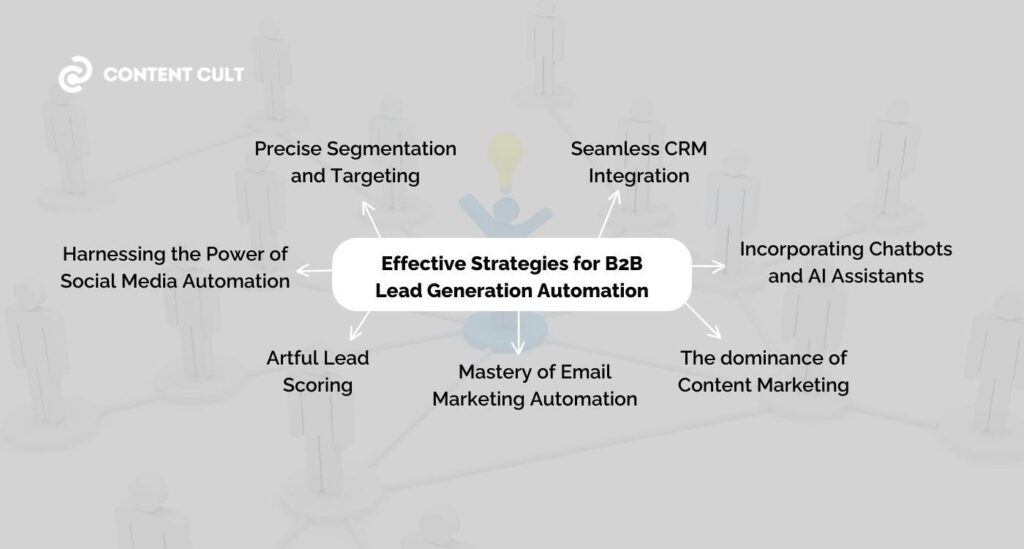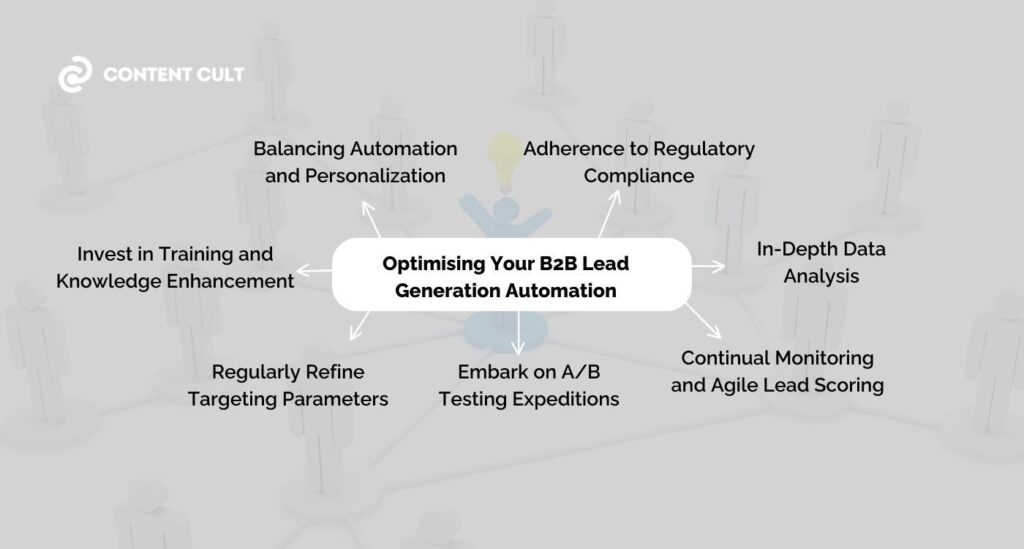In today’s rapidly evolving realm of B2B (business-to-business) marketing, one undeniable truth looms large: the acquisition of high-quality leads stands as a foundational pillar for ensuring sustainable growth. The march of technology has brought about a profound transformation in the domain of lead generation, rendering it more efficient and effective than ever before.
Welcome to the era of automating B2B lead generation—a shift poised to revolutionize how enterprises source, nurture, and convert potential leads.
In this comprehensive article, we will embark on a deep dive into the universe of B2B lead generation automation, exploring the multifaceted tools and strategies that can empower your business to not only survive but thrive in this fiercely competitive arena.
The B2B Lead Generation Landscape
Before we immerse ourselves in the nuances of automation, it is imperative to establish a comprehensive understanding of the complex dynamics that underpin B2B lead generation. In this context, a “lead” signifies a prospective customer who has exhibited a keen interest in your product or service, often by divulging their contact information.
Traditionally, the process of generating these leads relied heavily on manual methodologies, encompassing labour-intensive tasks such as cold calling, participation in trade shows, and the deployment of email campaigns.
While these conventional methods yielded some degree of success, they were often fraught with inefficiencies and demanded a substantial investment of time and resources. As businesses sought more cost-effective and scalable alternatives, the imperative for automation became increasingly evident.
The Power of Automating B2B Lead Generation
Automation, within the realm of B2B lead generation, harnesses the potent capabilities of technology to execute repetitive tasks, amass data, and engage with potential leads on a grand scale. This approach offers a multitude of compelling advantages:
Unprecedented Efficiency: Automated tools function ceaselessly, ensuring that no potential leads slip through the cracks. This round-the-clock engagement significantly enhances the likelihood of successful conversions.
Data-Driven Insights: Automation tools furnish valuable data and insights into lead behaviour and preferences. This trove of information can be harnessed judiciously to fine-tune your targeting strategies and craft highly personalised outreach initiatives, thereby elevating your conversion rates to new heights.
Scalability at its Finest: As your business expands its horizons and embarks on an upward trajectory, automation seamlessly adapts to accommodate an increased volume of leads, all without necessitating a proportional expansion of human resources.
Cost-Efficiency: Although there exists an initial investment associated with automation tools, the resultant long-term cost savings, in terms of both time and resources, are substantial and commendable.
Consistent Engagement: Automated processes guarantee that your messaging and follow-ups maintain unwavering consistency, presenting a professional and dependable image to potential customers.
Now that we’ve elucidated the myriad benefits of automating B2B lead generation, let’s delve deeper into the key strategies and tools that can facilitate a seamless transition into this realm of unparalleled efficiency.
Effective Strategies for B2B Lead Generation Automation

Source: Content-cult
Precise Segmentation and Targeting: The journey commences with the meticulous segmentation of your target audience based on diverse criteria such as industry, company size, or geographical location. This segmentation enables you to tailor your messaging and outreach with pinpoint accuracy, ensuring the highest degree of relevance.
The dominance of Content Marketing: The creation of valuable content—ranging from blog posts and ebooks to webinars—that addresses the pain points and needs of your target audience is paramount. Leveraging marketing automation tools to distribute this content to your leads and tracking their interactions adds a layer of finesse to your approach.
Artful Lead Scoring: The implementation of a lead scoring system, which assigns scores to leads based on their engagement levels and behavioural patterns, is essential. This system streamlines the process, allowing you to focus your efforts on the most promising prospects.
Mastery of Email Marketing Automation: Email marketing, a venerable titan in B2B lead generation, remains as influential as ever. Harnessing email marketing automation platforms to dispatch personalised and well-timed messages while nurturing leads and cultivating relationships is a tried-and-true strategy.
Harnessing the Power of Social Media Automation: Scheduling and automating your social media posts ensures a consistent online presence. Engaging with your audience, disseminating valuable content, and channelling traffic towards your landing pages are integral components of this approach.
Incorporating Chatbots and AI Assistants: Integrating chatbots and AI-powered assistants onto your website allows for real-time engagement with visitors. These virtual assistants are adept at answering common questions and capturing leads.
Seamless CRM Integration: Harmoniously integrating your lead generation tools with a Customer Relationship Management (CRM) system simplifies lead management, tracks interactions, and ensures a smooth transition from marketing to sales.
Streamlined Tools for B2B Lead Generation Automation
HubSpot: Renowned for its comprehensive suite of marketing automation tools, HubSpot offers functionalities ranging from email marketing to lead scoring and seamless CRM integration, making it a perennial favourite among B2B marketers.
Marketo: Lauded for its proficiency in lead management and nurturing, Marketo empowers businesses with the capacity to orchestrate highly personalised campaigns and in-depth lead tracking.
Pardot: Tailored explicitly for B2B marketing automation, Pardot boasts features including lead scoring, email marketing prowess, and seamless integration with Salesforce—a prominent CRM platform.
Mailchimp: While initially celebrated for its prowess in email marketing, Mailchimp has expanded its repertoire to encompass automation features, rendering it a versatile choice capable of catering to businesses of all dimensions.
LinkedIn Sales Navigator: A veritable goldmine of potential leads for B2B enterprises, LinkedIn’s Sales Navigator offers advanced search functionalities and adept lead management attributes, facilitating seamless connections with promising prospects.
Intercom: Exemplifying excellence in real-time communication with website visitors and app users, Intercom allows for instantaneous interactions and stellar support.
Drift: Specialising in conversational marketing, Drift employs chatbots for real-time engagement with website visitors, providing answers to common queries and functioning as diligent lead generators.
Leadfeeder: A tool par excellence for identifying website visitors and tracking their interactions, even if they refrain from submitting forms. This tool proves invaluable for businesses boasting a formidable online presence.
Optimising Your B2B Lead Generation Automation

Source: Content-cult
Regularly Refine Targeting Parameters: As your business evolves, so should your audience segments. Regularly revisiting and updating these parameters is essential to remain relevant.
Embark on A/B Testing Expeditions: Launch a series of A/B tests across various facets of your strategy—messaging, content, email subject lines—to discern what resonates most with your audience. The insights gleaned from these experiments should form the bedrock of your refinement efforts.
Continual Monitoring and Agile Lead Scoring: Establish a practice of continuous evaluation of your lead scoring system, ensuring that it remains attuned to the nuances of lead engagement and readiness for conversion. Flexibility in adjusting your scoring criteria is key.
In-Depth Data Analysis: Dedicate time to data analysis, drawing insights and identifying trends from the information amassed through your automation tools. These insights will inform strategic adjustments and refinements.
Balancing Automation and Personalization: While automation delivers power and efficiency, do not underestimate the value of personalization. Striking a harmonious equilibrium between automated interactions and human outreach when the situation warrants it is pivotal.
Adherence to Regulatory Compliance: Stay abreast of shifts in data protection regulations, such as GDPR, to ensure that your automation practices remain both ethically sound and legally compliant.
Invest in Training and Knowledge Enhancement: Make prudent investments in team training to extract the full potential of your automation tools. Staying well-informed about updates and best practices is imperative to harness the full scope of automation’s capabilities.
Conclusion
B2B lead generation automation is a monumental leap that has the potential to reshape your business’s growth trajectory. Armed with adept strategies and cutting-edge tools, you can efficiently capture, nurture, and convert leads at an unprecedented scale. Embrace the transformative power of automation to elevate your efficiency, gain invaluable insights, and cement your competitive edge in the dynamic world of B2B commerce.

